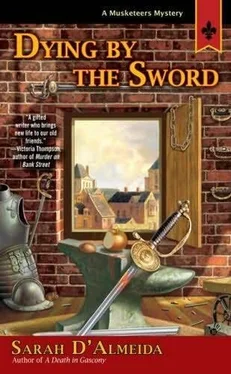Sarah D'Almeida - Dying by the Sword
Здесь есть возможность читать онлайн «Sarah D'Almeida - Dying by the Sword» весь текст электронной книги совершенно бесплатно (целиком полную версию без сокращений). В некоторых случаях можно слушать аудио, скачать через торрент в формате fb2 и присутствует краткое содержание. Жанр: Триллер, на английском языке. Описание произведения, (предисловие) а так же отзывы посетителей доступны на портале библиотеки ЛибКат.
- Название:Dying by the Sword
- Автор:
- Жанр:
- Год:неизвестен
- ISBN:нет данных
- Рейтинг книги:4 / 5. Голосов: 1
-
Избранное:Добавить в избранное
- Отзывы:
-
Ваша оценка:
- 80
- 1
- 2
- 3
- 4
- 5
Dying by the Sword: краткое содержание, описание и аннотация
Предлагаем к чтению аннотацию, описание, краткое содержание или предисловие (зависит от того, что написал сам автор книги «Dying by the Sword»). Если вы не нашли необходимую информацию о книге — напишите в комментариях, мы постараемся отыскать её.
As the Four Musketeers race to save Porthos's servant from the gallows, they run afoul of Cardinal Richelieu, who is investigating a far more serious matter – a plot against the life of the king.
Dying by the Sword — читать онлайн бесплатно полную книгу (весь текст) целиком
Ниже представлен текст книги, разбитый по страницам. Система сохранения места последней прочитанной страницы, позволяет с удобством читать онлайн бесплатно книгу «Dying by the Sword», без необходимости каждый раз заново искать на чём Вы остановились. Поставьте закладку, и сможете в любой момент перейти на страницу, на которой закончили чтение.
Интервал:
Закладка:
Was it possible that as soon as he’d galloped away-if not before-the branch from which he’d hanged her had snapped? She’d been unconscious when he strung her up, so it was quite possible, though perhaps not probable, that she had survived a few minutes. Athos knew that what caused first damage when being hanged-at least when there was no substantial drop to ensure the executed broke his neck in the fall-was the frantic struggle against the rope. Being unconscious might have preserved her life longer, and if either branch or rope had broken shortly after…
He walked through the darkening streets. So suppose Charlotte had survived. Why had she not sought him out? If she were innocent-a possibility he had tormented himself with for so long-would she not have written to him, explained her case, made it known why she’d been branded and which enemy had managed it? If she truly loved him… Wounded though she might be by his having believed the worst about her, would she not have tried to reconcile with him?
Even now, even though he had reason to believe she was truly a criminal, wouldn’t he take her back in a second, if it could be proven to him that she hadn’t been guilty? Wouldn’t he?
He knew from the straining of his heart, from the sting of tears behind his eyes, that he would. But his wife was in town, and she’d not contacted him-she’d not, to Athos’s knowledge, made any effort to see him. In fact, though Athos had recognized her from the turn of the head, the way she stood, from the elegant slimness of her body and that moonlight-blond hair, she hadn’t seemed to notice him at all. She hadn’t seemed to recognize him.
Had he not haunted her mind as she haunted his? Not even in rage or wish for vengeance?
And she had been going into the Palais Cardinal, with every appearance of being well-known there. Surely, if that was true, the Cardinal would have told her about Athos, about who Athos was and what he was doing. She would know exactly how he lived, and anyone who knew him would have good reason to believe how remorse blighted his life.
So he would have to believe that she had not contacted him because in fact she did not love him and never had. He had been a rung on her climb, and his reaction to her perfidy had only meant that she would avoid him in the future.
It was the logical conclusion, and it should have made him feel better. He had, for so long, carried remorse over what he’d done, and doubt over whether it had been needed. Now his question had been answered and he was, in fact, fully justified. So why didn’t he rejoice? Why did he feel as though a band of iron had tightened about his heart?
Looking around, he realized his feet had brought him to his lodgings. He unlocked the door and climbed up to his room, having decided to find some of those bottles that he had hidden from Grimaud’s sometimes astringent searches of his belongings. That Grimaud thought his master drank too much, Athos understood. That the man-who had in large measure helped to raise Athos-thought himself entitled to make it harder for Athos to find liquor when his mind was taken with this fog of grief and hopeless mourning for what hadn’t been nor could ever be, Athos accepted. But he could not-he simply could not-allow Grimaud to keep him from drinking entirely.
Grimaud thought that if Athos didn’t drink, he would be awake and more aware of his surroundings. Athos would agree that was true. But he also knew, with absolutely unflinching certainty, that there was a great anger that lived just beneath the surface of his mind. That anger could be dulled and covered up by drinking. Without it, Athos wasn’t sure what he would do-what he would have done by now.
His lodgings were a tall, narrow slice of a bigger building. There were three floors and a basement, but each barely large enough to contain more than a room. It had a little landing at the bottom of the stairs. The upstairs floor was entirely Athos’s-consisting mostly of his bedroom, but also of a room decorated with an ancestral portrait and sword, and furnished with a number of comfortable chairs. Here he kept a few of the books he had packaged and brought with him, and a few other books he had acquired over the years. Books, like wine, could dull the pain and make him forget the anger, at least for a while. And here he and his friends often met, to discuss what they should do when faced with a dilemma.
On the bottom floor, there was a dining room, and the kitchen at which Grimaud’s labors often managed to produce meals that could have graced the kitchen back at La Fere -meals that were, more often than not, wasted on the master who would have preferred to drink his dinner.
As Athos was about to set his feet on the steps, he heard a voice say, “Monsieur, monsieur. I have bound wounds before. Please do not tell me how to do it.”
The voice was undeniably Grimaud’s, and undeniably it spoke the truth. Athos’s first thought was that one of the servants had got wounded and that Grimaud was binding his wound, while discussing it with the other servant. Perhaps, in fact, Mousqueton had escaped the Bastille, through either cunning or luck, and was wounded, and this wound Grimaud was attempting to bind. But there was no possible way their servants-by now as much comrades at arms as they, themselves were-would call each other monsieur.
They perhaps liked Bazin a little less than the other three, but even he would never be addressed as monsieur. They called him Bazin, and might roll their eyes at his pious pronouncements, and yet they did what they could to keep him safe and they remained his friends.
“Grimaud,” Planchet’s voice said. “He faints. My master faints.”
This was a completely different matter. What D’Artagnan would be doing in Athos’s kitchen, and why he should be fainting, was totally beyond Athos’s comprehension. But Athos was almost old enough to be D’Artagnan’s father, and the young Gascon, with his quickness of mind, his cunning, his brilliance with a sword and his unswerving loyalty to his friends, was exactly the son that Athos would have liked to claim. There was between them a bond that was only half friendship. The other half was Athos’s almost desperate wish to protect the young man from the strokes he himself had suffered at the hands of fate.
The idea that D’Artagnan was wounded or ill carried him all the way into the kitchen and onto a scene of the purest mayhem. There was blood all over, on every possible surface. The kitchen table, at which Grimaud normally prepared food, and at which Grimaud ate-no matter how often Athos told him he could serve him there, also, if they were alone. Grimaud insisted on serving the man who would always be Monsieur le Comte to him either in the dining room or in Athos’s own room-had bloodstains, and a basin filled with blood-colored water. Bloodied rags littered the floor. There was blood on the servants, blood on Aramis’s incredibly elaborate doublet, cut according to the latest and most daring fashion, in blue velvet and flame-colored satin, and on Porthos’s cheek and the ends of his red hair.
In the midst of all this, D’Artagnan sat, stripped to the waist. There was blood all over him too, blood on the various ligatures wound around his arm. And, as Athos watched, the rest of them, not seeing him, had rallied around D’Artagnan with the obvious idea of preventing an imminent collapse. Aramis was supporting the young man, and Porthos was helping-one hampering the other, in the way the two of them were likely to, when they both acted out of the best intentions and without coordinating intents. And, standing by D’Artagnan, Grimaud-Grimaud, who sometimes could behave as though alcohol were the enemy of man, as the puritans in England believed-was pouring something amber colored into D’Artagnan’s half-open mouth.
Читать дальшеИнтервал:
Закладка:
Похожие книги на «Dying by the Sword»
Представляем Вашему вниманию похожие книги на «Dying by the Sword» списком для выбора. Мы отобрали схожую по названию и смыслу литературу в надежде предоставить читателям больше вариантов отыскать новые, интересные, ещё непрочитанные произведения.
Обсуждение, отзывы о книге «Dying by the Sword» и просто собственные мнения читателей. Оставьте ваши комментарии, напишите, что Вы думаете о произведении, его смысле или главных героях. Укажите что конкретно понравилось, а что нет, и почему Вы так считаете.











